Report: Ethical and Legal Aspects of KSA Healthcare Regulations
VerifiedAdded on 2023/04/24
|7
|1668
|153
Report
AI Summary
This report analyzes the regulatory framework of healthcare in King Saudi Arabia (KSA), particularly concerning patient information management, patient autonomy, and electronic health records (EHR). It examines three peer-reviewed articles discussing ethical measures and barriers related to patient information systems. The report highlights challenges such as the absence of a national system, lack of computer professional experience, inadequate guidelines, the high cost of IT adoption, and a lack of trust among healthcare workers. It also explores the legal aspects, including compliance with laws and regulations, and the constraints in implementing these aspects. The importance of training for healthcare professionals is emphasized, along with recommendations for improving care practice, such as reviewing qualifications, monitoring medical information handling, and updating regulations. The report concludes that proper training and education, along with improved protocols, are essential for maintaining patient autonomy and ensuring the appropriate handling of patient information in KSA's healthcare settings.
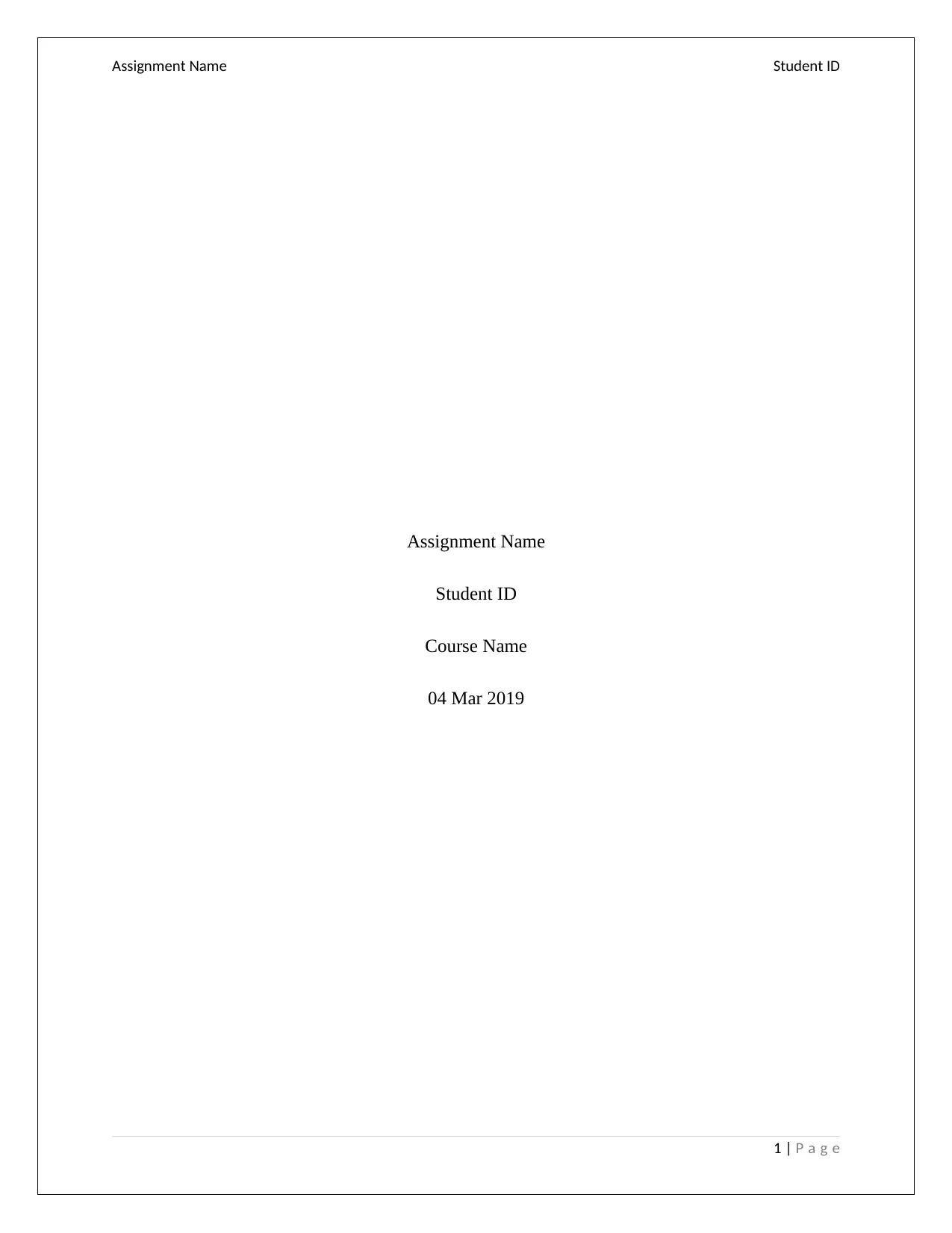
Assignment Name Student ID
Assignment Name
Student ID
Course Name
04 Mar 2019
1 | P a g e
Assignment Name
Student ID
Course Name
04 Mar 2019
1 | P a g e
Paraphrase This Document
Need a fresh take? Get an instant paraphrase of this document with our AI Paraphraser
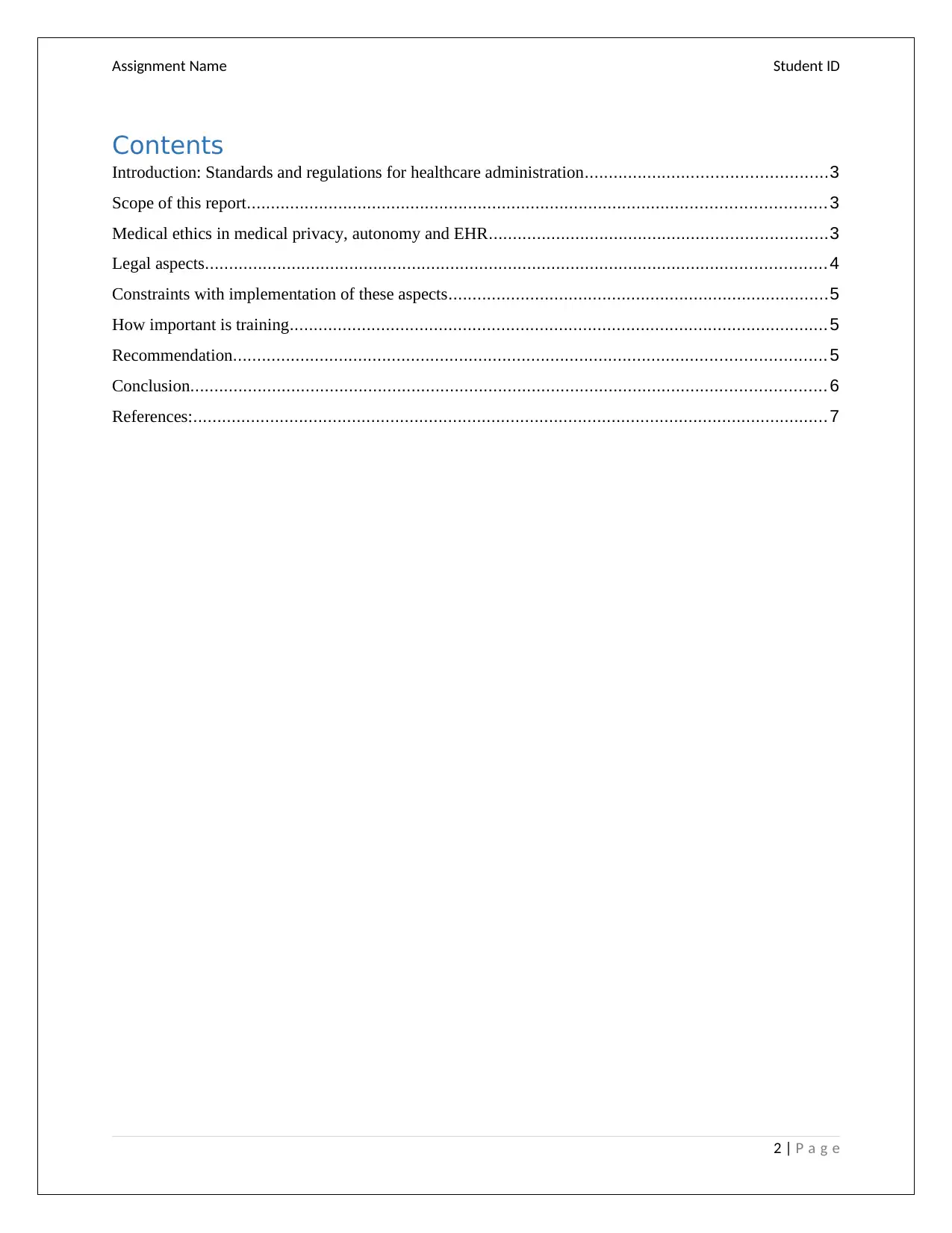
Assignment Name Student ID
Contents
Introduction: Standards and regulations for healthcare administration..................................................3
Scope of this report........................................................................................................................ 3
Medical ethics in medical privacy, autonomy and EHR......................................................................3
Legal aspects................................................................................................................................. 4
Constraints with implementation of these aspects...............................................................................5
How important is training................................................................................................................ 5
Recommendation........................................................................................................................... 5
Conclusion.................................................................................................................................... 6
References:.................................................................................................................................... 7
2 | P a g e
Contents
Introduction: Standards and regulations for healthcare administration..................................................3
Scope of this report........................................................................................................................ 3
Medical ethics in medical privacy, autonomy and EHR......................................................................3
Legal aspects................................................................................................................................. 4
Constraints with implementation of these aspects...............................................................................5
How important is training................................................................................................................ 5
Recommendation........................................................................................................................... 5
Conclusion.................................................................................................................................... 6
References:.................................................................................................................................... 7
2 | P a g e
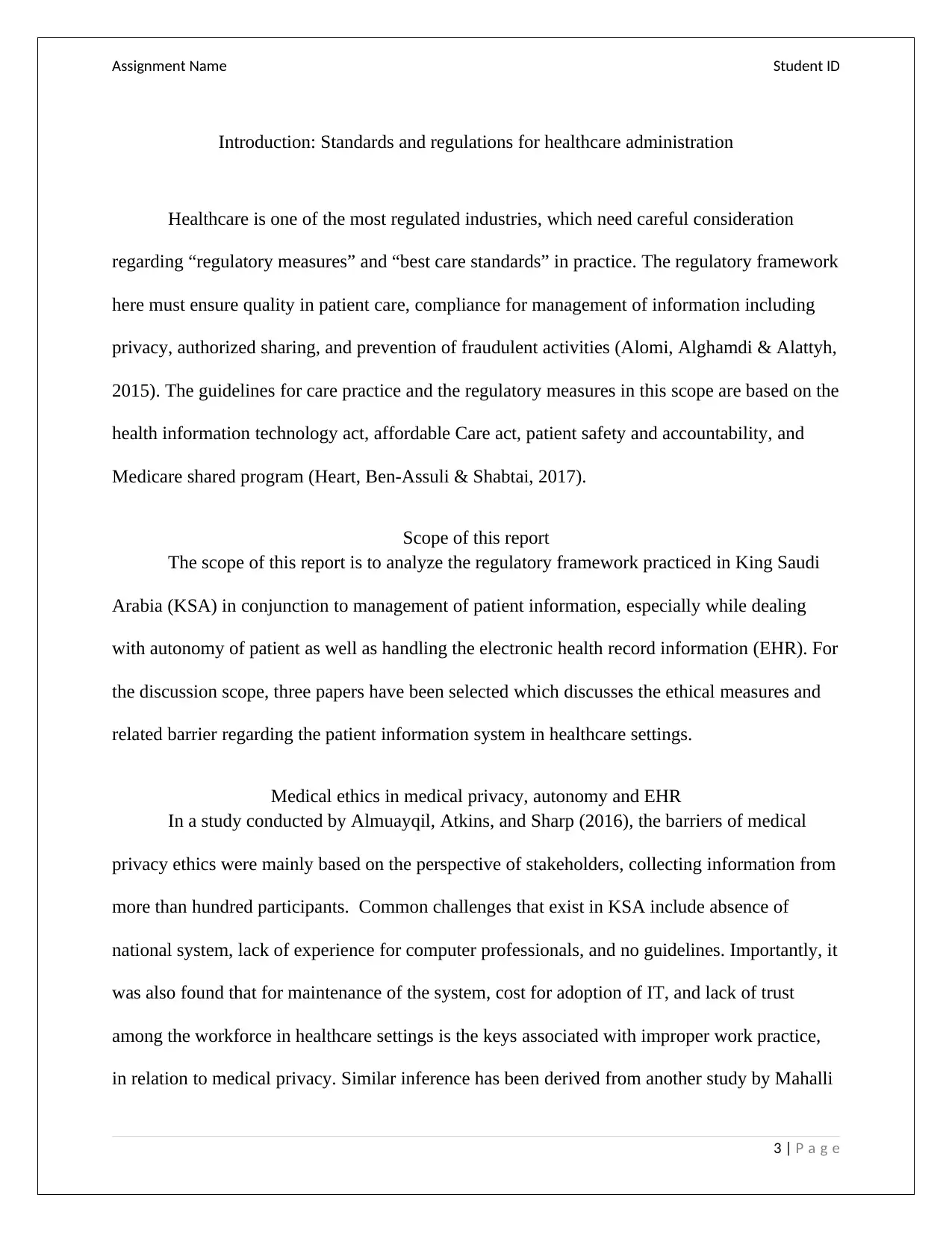
Assignment Name Student ID
Introduction: Standards and regulations for healthcare administration
Healthcare is one of the most regulated industries, which need careful consideration
regarding “regulatory measures” and “best care standards” in practice. The regulatory framework
here must ensure quality in patient care, compliance for management of information including
privacy, authorized sharing, and prevention of fraudulent activities (Alomi, Alghamdi & Alattyh,
2015). The guidelines for care practice and the regulatory measures in this scope are based on the
health information technology act, affordable Care act, patient safety and accountability, and
Medicare shared program (Heart, Ben-Assuli & Shabtai, 2017).
Scope of this report
The scope of this report is to analyze the regulatory framework practiced in King Saudi
Arabia (KSA) in conjunction to management of patient information, especially while dealing
with autonomy of patient as well as handling the electronic health record information (EHR). For
the discussion scope, three papers have been selected which discusses the ethical measures and
related barrier regarding the patient information system in healthcare settings.
Medical ethics in medical privacy, autonomy and EHR
In a study conducted by Almuayqil, Atkins, and Sharp (2016), the barriers of medical
privacy ethics were mainly based on the perspective of stakeholders, collecting information from
more than hundred participants. Common challenges that exist in KSA include absence of
national system, lack of experience for computer professionals, and no guidelines. Importantly, it
was also found that for maintenance of the system, cost for adoption of IT, and lack of trust
among the workforce in healthcare settings is the keys associated with improper work practice,
in relation to medical privacy. Similar inference has been derived from another study by Mahalli
3 | P a g e
Introduction: Standards and regulations for healthcare administration
Healthcare is one of the most regulated industries, which need careful consideration
regarding “regulatory measures” and “best care standards” in practice. The regulatory framework
here must ensure quality in patient care, compliance for management of information including
privacy, authorized sharing, and prevention of fraudulent activities (Alomi, Alghamdi & Alattyh,
2015). The guidelines for care practice and the regulatory measures in this scope are based on the
health information technology act, affordable Care act, patient safety and accountability, and
Medicare shared program (Heart, Ben-Assuli & Shabtai, 2017).
Scope of this report
The scope of this report is to analyze the regulatory framework practiced in King Saudi
Arabia (KSA) in conjunction to management of patient information, especially while dealing
with autonomy of patient as well as handling the electronic health record information (EHR). For
the discussion scope, three papers have been selected which discusses the ethical measures and
related barrier regarding the patient information system in healthcare settings.
Medical ethics in medical privacy, autonomy and EHR
In a study conducted by Almuayqil, Atkins, and Sharp (2016), the barriers of medical
privacy ethics were mainly based on the perspective of stakeholders, collecting information from
more than hundred participants. Common challenges that exist in KSA include absence of
national system, lack of experience for computer professionals, and no guidelines. Importantly, it
was also found that for maintenance of the system, cost for adoption of IT, and lack of trust
among the workforce in healthcare settings is the keys associated with improper work practice,
in relation to medical privacy. Similar inference has been derived from another study by Mahalli
3 | P a g e
⊘ This is a preview!⊘
Do you want full access?
Subscribe today to unlock all pages.

Trusted by 1+ million students worldwide
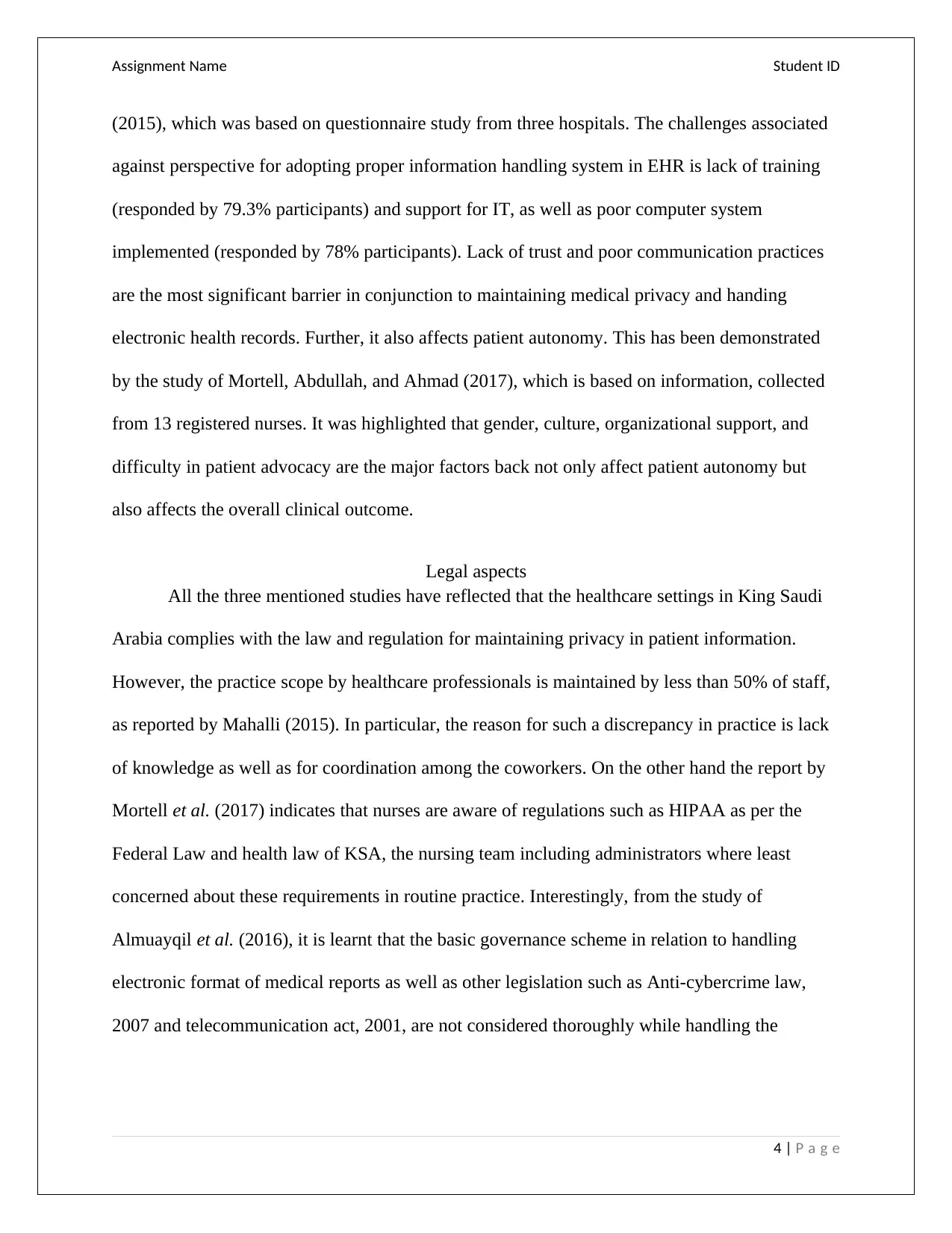
Assignment Name Student ID
(2015), which was based on questionnaire study from three hospitals. The challenges associated
against perspective for adopting proper information handling system in EHR is lack of training
(responded by 79.3% participants) and support for IT, as well as poor computer system
implemented (responded by 78% participants). Lack of trust and poor communication practices
are the most significant barrier in conjunction to maintaining medical privacy and handing
electronic health records. Further, it also affects patient autonomy. This has been demonstrated
by the study of Mortell, Abdullah, and Ahmad (2017), which is based on information, collected
from 13 registered nurses. It was highlighted that gender, culture, organizational support, and
difficulty in patient advocacy are the major factors back not only affect patient autonomy but
also affects the overall clinical outcome.
Legal aspects
All the three mentioned studies have reflected that the healthcare settings in King Saudi
Arabia complies with the law and regulation for maintaining privacy in patient information.
However, the practice scope by healthcare professionals is maintained by less than 50% of staff,
as reported by Mahalli (2015). In particular, the reason for such a discrepancy in practice is lack
of knowledge as well as for coordination among the coworkers. On the other hand the report by
Mortell et al. (2017) indicates that nurses are aware of regulations such as HIPAA as per the
Federal Law and health law of KSA, the nursing team including administrators where least
concerned about these requirements in routine practice. Interestingly, from the study of
Almuayqil et al. (2016), it is learnt that the basic governance scheme in relation to handling
electronic format of medical reports as well as other legislation such as Anti-cybercrime law,
2007 and telecommunication act, 2001, are not considered thoroughly while handling the
4 | P a g e
(2015), which was based on questionnaire study from three hospitals. The challenges associated
against perspective for adopting proper information handling system in EHR is lack of training
(responded by 79.3% participants) and support for IT, as well as poor computer system
implemented (responded by 78% participants). Lack of trust and poor communication practices
are the most significant barrier in conjunction to maintaining medical privacy and handing
electronic health records. Further, it also affects patient autonomy. This has been demonstrated
by the study of Mortell, Abdullah, and Ahmad (2017), which is based on information, collected
from 13 registered nurses. It was highlighted that gender, culture, organizational support, and
difficulty in patient advocacy are the major factors back not only affect patient autonomy but
also affects the overall clinical outcome.
Legal aspects
All the three mentioned studies have reflected that the healthcare settings in King Saudi
Arabia complies with the law and regulation for maintaining privacy in patient information.
However, the practice scope by healthcare professionals is maintained by less than 50% of staff,
as reported by Mahalli (2015). In particular, the reason for such a discrepancy in practice is lack
of knowledge as well as for coordination among the coworkers. On the other hand the report by
Mortell et al. (2017) indicates that nurses are aware of regulations such as HIPAA as per the
Federal Law and health law of KSA, the nursing team including administrators where least
concerned about these requirements in routine practice. Interestingly, from the study of
Almuayqil et al. (2016), it is learnt that the basic governance scheme in relation to handling
electronic format of medical reports as well as other legislation such as Anti-cybercrime law,
2007 and telecommunication act, 2001, are not considered thoroughly while handling the
4 | P a g e
Paraphrase This Document
Need a fresh take? Get an instant paraphrase of this document with our AI Paraphraser
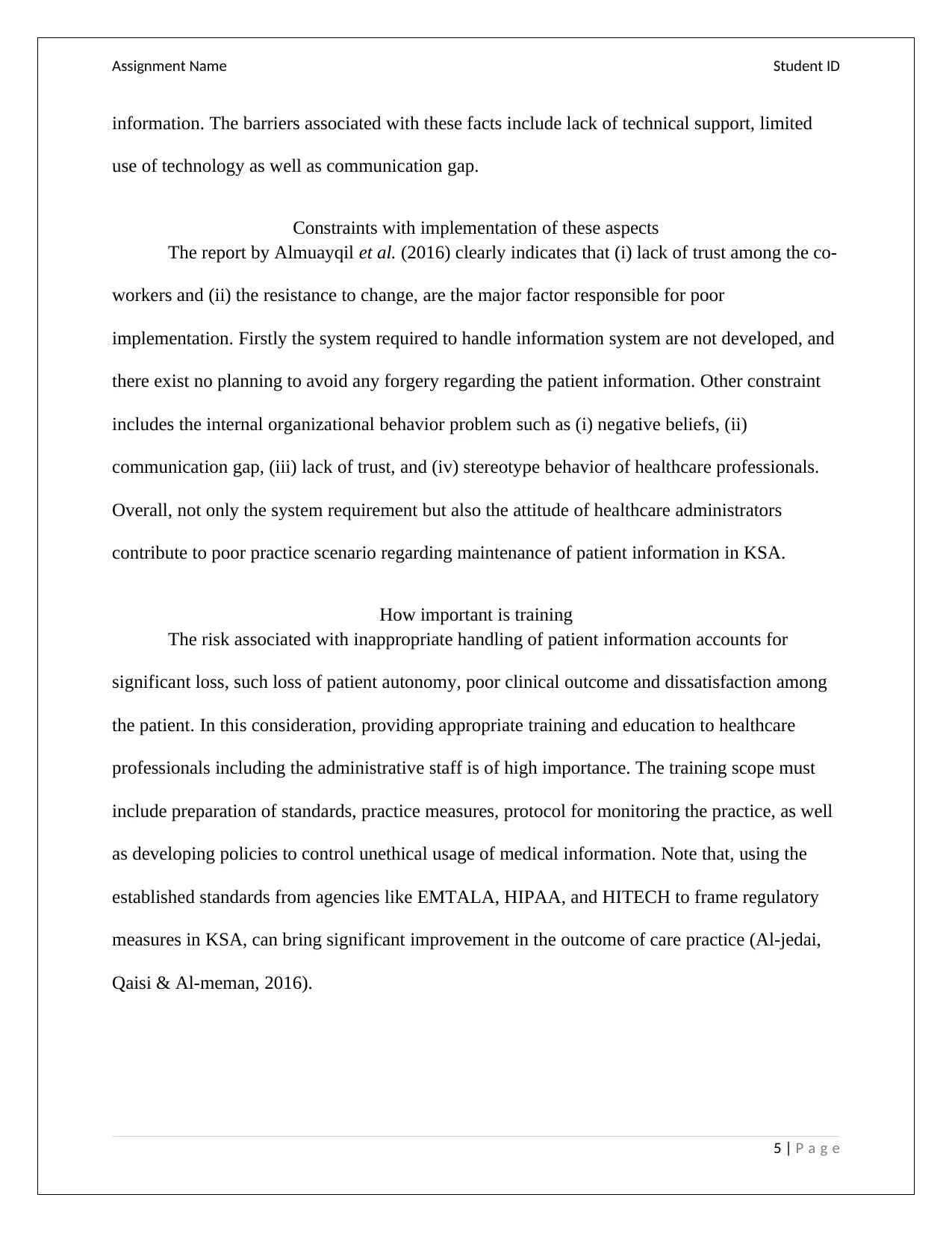
Assignment Name Student ID
information. The barriers associated with these facts include lack of technical support, limited
use of technology as well as communication gap.
Constraints with implementation of these aspects
The report by Almuayqil et al. (2016) clearly indicates that (i) lack of trust among the co-
workers and (ii) the resistance to change, are the major factor responsible for poor
implementation. Firstly the system required to handle information system are not developed, and
there exist no planning to avoid any forgery regarding the patient information. Other constraint
includes the internal organizational behavior problem such as (i) negative beliefs, (ii)
communication gap, (iii) lack of trust, and (iv) stereotype behavior of healthcare professionals.
Overall, not only the system requirement but also the attitude of healthcare administrators
contribute to poor practice scenario regarding maintenance of patient information in KSA.
How important is training
The risk associated with inappropriate handling of patient information accounts for
significant loss, such loss of patient autonomy, poor clinical outcome and dissatisfaction among
the patient. In this consideration, providing appropriate training and education to healthcare
professionals including the administrative staff is of high importance. The training scope must
include preparation of standards, practice measures, protocol for monitoring the practice, as well
as developing policies to control unethical usage of medical information. Note that, using the
established standards from agencies like EMTALA, HIPAA, and HITECH to frame regulatory
measures in KSA, can bring significant improvement in the outcome of care practice (Al-jedai,
Qaisi & Al-meman, 2016).
5 | P a g e
information. The barriers associated with these facts include lack of technical support, limited
use of technology as well as communication gap.
Constraints with implementation of these aspects
The report by Almuayqil et al. (2016) clearly indicates that (i) lack of trust among the co-
workers and (ii) the resistance to change, are the major factor responsible for poor
implementation. Firstly the system required to handle information system are not developed, and
there exist no planning to avoid any forgery regarding the patient information. Other constraint
includes the internal organizational behavior problem such as (i) negative beliefs, (ii)
communication gap, (iii) lack of trust, and (iv) stereotype behavior of healthcare professionals.
Overall, not only the system requirement but also the attitude of healthcare administrators
contribute to poor practice scenario regarding maintenance of patient information in KSA.
How important is training
The risk associated with inappropriate handling of patient information accounts for
significant loss, such loss of patient autonomy, poor clinical outcome and dissatisfaction among
the patient. In this consideration, providing appropriate training and education to healthcare
professionals including the administrative staff is of high importance. The training scope must
include preparation of standards, practice measures, protocol for monitoring the practice, as well
as developing policies to control unethical usage of medical information. Note that, using the
established standards from agencies like EMTALA, HIPAA, and HITECH to frame regulatory
measures in KSA, can bring significant improvement in the outcome of care practice (Al-jedai,
Qaisi & Al-meman, 2016).
5 | P a g e
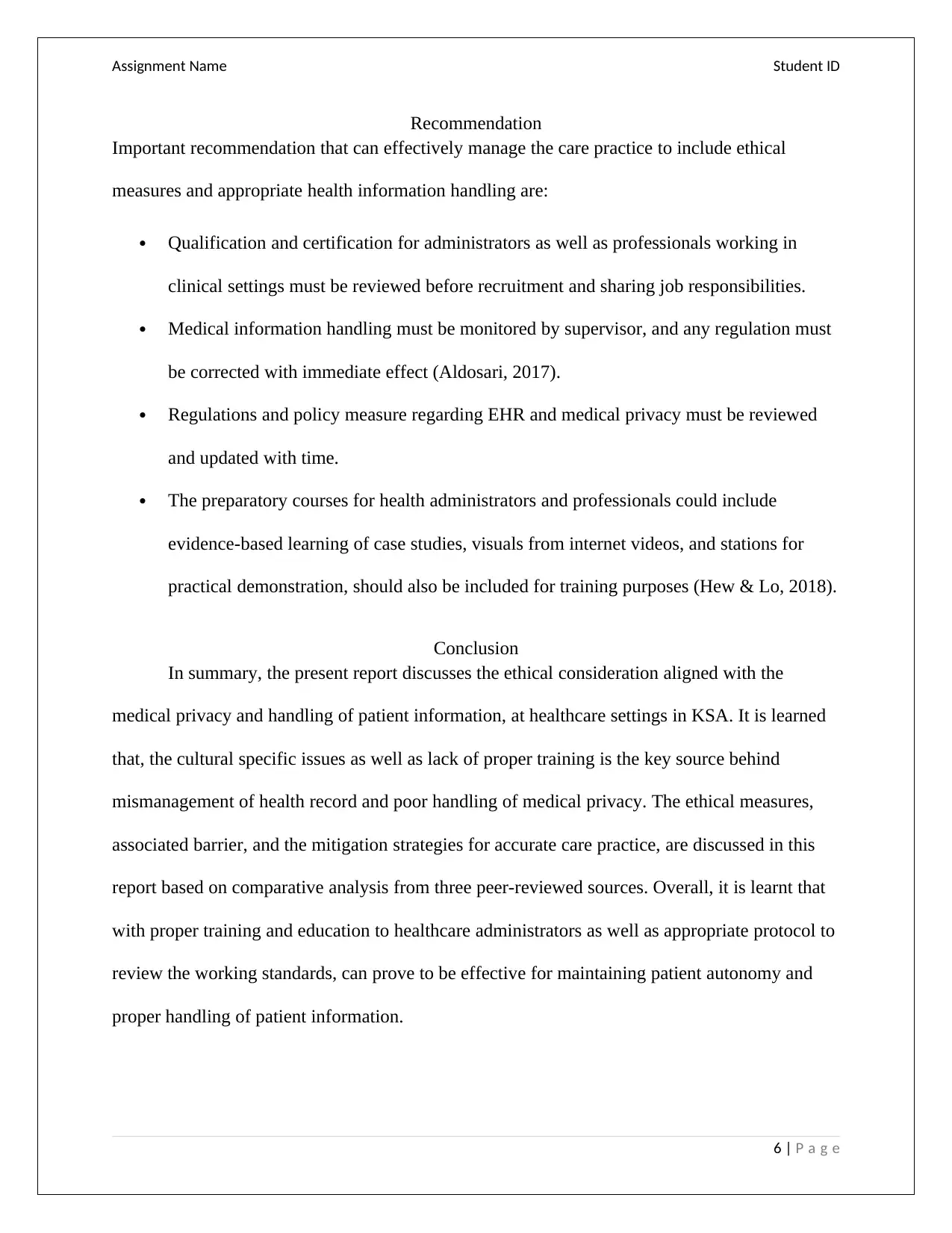
Assignment Name Student ID
Recommendation
Important recommendation that can effectively manage the care practice to include ethical
measures and appropriate health information handling are:
Qualification and certification for administrators as well as professionals working in
clinical settings must be reviewed before recruitment and sharing job responsibilities.
Medical information handling must be monitored by supervisor, and any regulation must
be corrected with immediate effect (Aldosari, 2017).
Regulations and policy measure regarding EHR and medical privacy must be reviewed
and updated with time.
The preparatory courses for health administrators and professionals could include
evidence-based learning of case studies, visuals from internet videos, and stations for
practical demonstration, should also be included for training purposes (Hew & Lo, 2018).
Conclusion
In summary, the present report discusses the ethical consideration aligned with the
medical privacy and handling of patient information, at healthcare settings in KSA. It is learned
that, the cultural specific issues as well as lack of proper training is the key source behind
mismanagement of health record and poor handling of medical privacy. The ethical measures,
associated barrier, and the mitigation strategies for accurate care practice, are discussed in this
report based on comparative analysis from three peer-reviewed sources. Overall, it is learnt that
with proper training and education to healthcare administrators as well as appropriate protocol to
review the working standards, can prove to be effective for maintaining patient autonomy and
proper handling of patient information.
6 | P a g e
Recommendation
Important recommendation that can effectively manage the care practice to include ethical
measures and appropriate health information handling are:
Qualification and certification for administrators as well as professionals working in
clinical settings must be reviewed before recruitment and sharing job responsibilities.
Medical information handling must be monitored by supervisor, and any regulation must
be corrected with immediate effect (Aldosari, 2017).
Regulations and policy measure regarding EHR and medical privacy must be reviewed
and updated with time.
The preparatory courses for health administrators and professionals could include
evidence-based learning of case studies, visuals from internet videos, and stations for
practical demonstration, should also be included for training purposes (Hew & Lo, 2018).
Conclusion
In summary, the present report discusses the ethical consideration aligned with the
medical privacy and handling of patient information, at healthcare settings in KSA. It is learned
that, the cultural specific issues as well as lack of proper training is the key source behind
mismanagement of health record and poor handling of medical privacy. The ethical measures,
associated barrier, and the mitigation strategies for accurate care practice, are discussed in this
report based on comparative analysis from three peer-reviewed sources. Overall, it is learnt that
with proper training and education to healthcare administrators as well as appropriate protocol to
review the working standards, can prove to be effective for maintaining patient autonomy and
proper handling of patient information.
6 | P a g e
⊘ This is a preview!⊘
Do you want full access?
Subscribe today to unlock all pages.

Trusted by 1+ million students worldwide
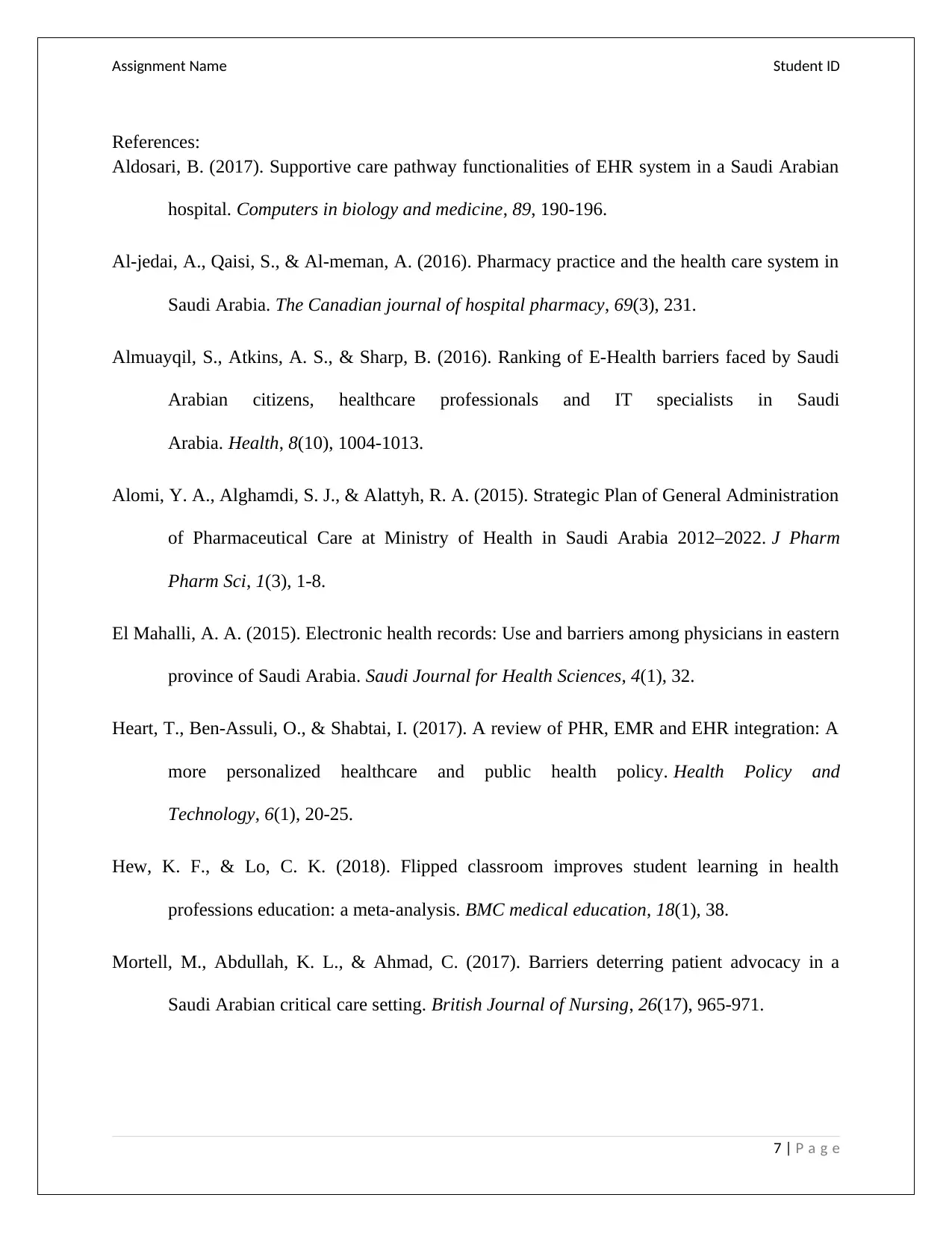
Assignment Name Student ID
References:
Aldosari, B. (2017). Supportive care pathway functionalities of EHR system in a Saudi Arabian
hospital. Computers in biology and medicine, 89, 190-196.
Al-jedai, A., Qaisi, S., & Al-meman, A. (2016). Pharmacy practice and the health care system in
Saudi Arabia. The Canadian journal of hospital pharmacy, 69(3), 231.
Almuayqil, S., Atkins, A. S., & Sharp, B. (2016). Ranking of E-Health barriers faced by Saudi
Arabian citizens, healthcare professionals and IT specialists in Saudi
Arabia. Health, 8(10), 1004-1013.
Alomi, Y. A., Alghamdi, S. J., & Alattyh, R. A. (2015). Strategic Plan of General Administration
of Pharmaceutical Care at Ministry of Health in Saudi Arabia 2012–2022. J Pharm
Pharm Sci, 1(3), 1-8.
El Mahalli, A. A. (2015). Electronic health records: Use and barriers among physicians in eastern
province of Saudi Arabia. Saudi Journal for Health Sciences, 4(1), 32.
Heart, T., Ben-Assuli, O., & Shabtai, I. (2017). A review of PHR, EMR and EHR integration: A
more personalized healthcare and public health policy. Health Policy and
Technology, 6(1), 20-25.
Hew, K. F., & Lo, C. K. (2018). Flipped classroom improves student learning in health
professions education: a meta-analysis. BMC medical education, 18(1), 38.
Mortell, M., Abdullah, K. L., & Ahmad, C. (2017). Barriers deterring patient advocacy in a
Saudi Arabian critical care setting. British Journal of Nursing, 26(17), 965-971.
7 | P a g e
References:
Aldosari, B. (2017). Supportive care pathway functionalities of EHR system in a Saudi Arabian
hospital. Computers in biology and medicine, 89, 190-196.
Al-jedai, A., Qaisi, S., & Al-meman, A. (2016). Pharmacy practice and the health care system in
Saudi Arabia. The Canadian journal of hospital pharmacy, 69(3), 231.
Almuayqil, S., Atkins, A. S., & Sharp, B. (2016). Ranking of E-Health barriers faced by Saudi
Arabian citizens, healthcare professionals and IT specialists in Saudi
Arabia. Health, 8(10), 1004-1013.
Alomi, Y. A., Alghamdi, S. J., & Alattyh, R. A. (2015). Strategic Plan of General Administration
of Pharmaceutical Care at Ministry of Health in Saudi Arabia 2012–2022. J Pharm
Pharm Sci, 1(3), 1-8.
El Mahalli, A. A. (2015). Electronic health records: Use and barriers among physicians in eastern
province of Saudi Arabia. Saudi Journal for Health Sciences, 4(1), 32.
Heart, T., Ben-Assuli, O., & Shabtai, I. (2017). A review of PHR, EMR and EHR integration: A
more personalized healthcare and public health policy. Health Policy and
Technology, 6(1), 20-25.
Hew, K. F., & Lo, C. K. (2018). Flipped classroom improves student learning in health
professions education: a meta-analysis. BMC medical education, 18(1), 38.
Mortell, M., Abdullah, K. L., & Ahmad, C. (2017). Barriers deterring patient advocacy in a
Saudi Arabian critical care setting. British Journal of Nursing, 26(17), 965-971.
7 | P a g e
1 out of 7
Related Documents
Your All-in-One AI-Powered Toolkit for Academic Success.
+13062052269
info@desklib.com
Available 24*7 on WhatsApp / Email
![[object Object]](/_next/static/media/star-bottom.7253800d.svg)
Unlock your academic potential
Copyright © 2020–2026 A2Z Services. All Rights Reserved. Developed and managed by ZUCOL.





